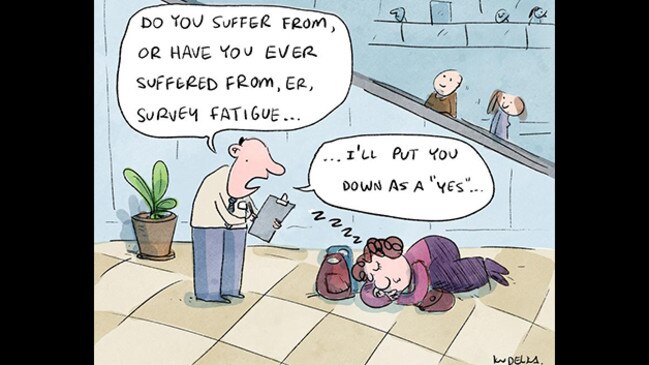Customer feedback surveys: it’s not about you, it’s about them
The customer feedback survey has become a sneaky way for companies to gain free corporate services.

Not too long ago, companies told you how valuable you were by keeping you waiting on the end of the phone for an hour or so. Now they tell you how valuable you are by asking endless questions on email.
It’s easy to get lured into providing customer feedback. It makes you feel important. It’s a way of getting frustrations out of your system that spares the cat’s bum. And there’s always the vague hope that at the end of the 10 pages of questions, a jackpot will ring and you’ll be off to Europe on an all-expenses-paid holiday.
But many of us are getting survey fatigue. Yes, that’s an expression in marketing circles but it’s also how you feel when you get to the second page of a feedback form and start thinking: “This is not about me any more.”
I got to that point when I was halfway through feeding back to the maker of a standing desk. The early questions were OK — What made you consider buying one? In what environment are you using it? — but then they got more personal: What media do you spend time with? Have you noticed a change in productivity? How many people in your office use one?
If you get to the second page of a feedback form, chances are you’re being asked to do the company’s market research, provide a performance rating for customer staff, redesign a website, contribute a testimonial to its advertising and, what’s worst, set yourself up for another selling opportunity from the company.
Frankly I’d need a big jackpot to provide all those corporate services for free.
But many of us do provide this information for free, which is why more companies are following customers around online like a whiny toddler asking what you think of them.
If you’re curious why banks, telcos, airlines and standing-desk suppliers are so keen on feedback, just browse the literature on survey marketing. First, it’s cheap market information. They don’t have to send people out on the street with clipboards; they just automatically shoot surveys back to anyone who interacts online or on the phone. They get information about their staff, sites and systems; they can use the information to rev up sales teams or dress them down, and they might get a free testimonial.
The smarter companies combine the information you give them with the data they have from your online interaction with them. This will tell them why you stopped buying the airline ticket at the point where they asked for a charity donation. Or it might explain why you signed up for something but never used it. Analytics, it’s worth a lot more to them than to you.
But customer comments could also be gobbled up by a data bot and used by the company to sell them something else; or passed on to another company for a sales opportunity; or end up in the hands of a law firm that’s litigating on, say, standing desks and bad backs.
If this sounds outlandish, consider the way some companies have used feedback to reconstruct themselves. One of the smartest reactions to poor feedback was Hootsuite’s response to negative comments on the design of its social media management app. It got its tech staff to read out the worst comments — “butt ugly”, “very Windows 95” and “looks like something my kid slapped together” — and made a YouTube video of it. By the end of the video, Hootsuite was showing off its new design.
It’s time to even the score and start answering the questions we’d like to see on surveys.
Here’s one. How would you rate the interest rate you are receiving on this back account — too low, just right or too high? If you answered too low, what sort of rate would you like?
Or, how do you rate your online flight booking experience? Did the final amount at the checkout surprise you? Would you like to see (1) lower fares, (2) free upgrades or (3) the fare that was originally advertised?
In the meantime, I’d like to add one feedback to the standing-desk company. I bought your desk because I like to stand up when I’m throwing brickbats.
macken.deirdre@gmail.com (no feedback form required)



To join the conversation, please log in. Don't have an account? Register
Join the conversation, you are commenting as Logout